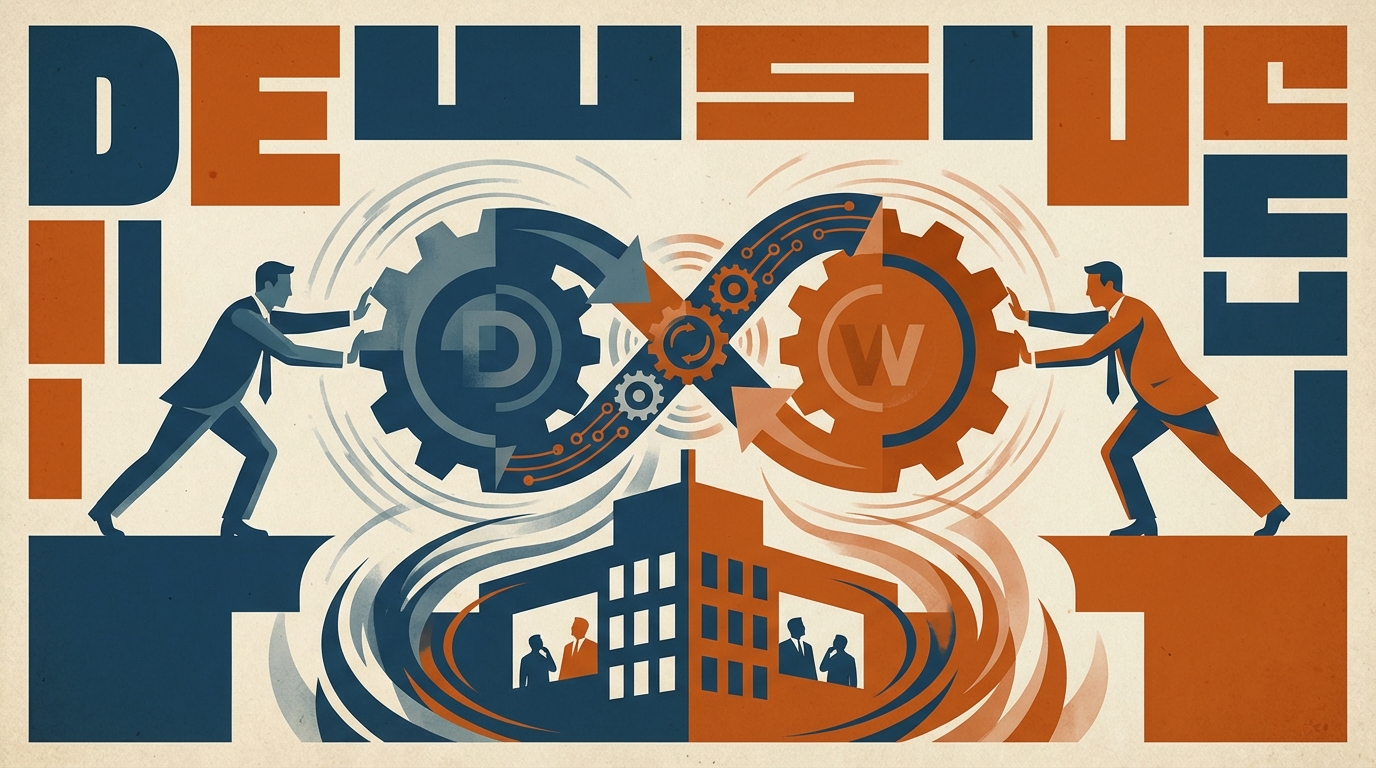THIS WEEK'S ANALYSIS
Universities Spend Millions Fighting AI While Mandating Its Mastery
Higher education faces a striking paradox: institutions are investing heavily in AI detection systems to combat machine-written assignments while simultaneously declaring AI literacy an essential graduate competency. This contradiction reveals deeper tensions between technological determinism and pedagogical agency, as faculty struggle to reconceptualize assessment in an era where AI collaboration may be both inevitable and beneficial. The fragmented response—spanning regulatory frameworks, ethical guidelines, and technical tools—suggests no single approach can address AI's complexity in education. As detection software flags excellence as artificial, we must ask whether our defensive stance against AI undermines the very critical thinking and human-machine collaboration skills we claim to foster.
Navigate through editorial illustrations synthesizing this week's critical findings. Each image represents a systemic pattern, contradiction, or gap identified in the analysis.
PERSPECTIVES

Through McLuhan's Lens
Faculty gather in windowless rooms, watching demos of AI detection software promising 97% accuracy. Meanwhile, computer science professors whisper about GPT-5's arrival. As universities pour resources...
Read Column →
Through Toffler's Lens
Universities are bleeding $15 million yearly on AI detection tools while mandating AI literacy—a paradox that would fascinate futurist Alvin Toffler. His wave theory explains why this technological ar...
Read Column →
Through Asimov's Lens
A tenured professor's carefully crafted research paper gets flagged as "87% AI-generated" by her university's new $15 million detection system. The reason? Her writing had become too clear, too logica...
Read Column →THIS WEEK'S PODCASTSYT
HIGHER EDUCATION
Teaching & Learning Discussion
This week: Educational institutions frame AI integration as inevitable technological progress while ignoring fundamental questions about pedagogical purpose. Policy documents mandate ethical frameworks and responsible use guidelines, yet assume adoption without examining whether AI enhances learning. This technological determinism creates a paradox: educators must develop AI literacy curricula for tools whose educational value remains unproven, forcing them to prepare students for an assumed future rather than demonstrated needs.
SOCIAL ASPECTS
Equity & Access Discussion
This week: Social institutions are fragmenting under algorithmic pressure, yet no coherent framework exists to address the dissolution. Communities report increasing isolation despite hyperconnectivity, while traditional support structures collapse without digital replacements. The absence of identified patterns itself signals a critical transition: we're between social operating systems, with the old failing and the new unformed.
AI LITERACY
Knowledge & Skills Discussion
This week: Why do we frame AI literacy as risk management rather than skill development? While educational frameworks emphasize critical evaluation and ethical imperatives, technical competencies remain secondary. This protective stance creates a paradox: students learn to fear AI's dangers without gaining practical abilities to harness its potential. The gap between defensive pedagogy and transformative possibility leaves learners equipped to critique but not create.
AI TOOLS
Implementation Discussion
This week: Universities declare AI integration historically inevitable while their policies remain stuck in detection mode. Faculty face an impossible choice: embrace tools their institutions haven't learned to govern, or enforce bans that leave students unprepared for AI-saturated workplaces. This implementation paralysis reveals how technological determinism collides with institutional inertia, creating educational environments where progress rhetoric masks policy stagnation.
Weekly Intelligence Briefing
Tailored intelligence briefings for different stakeholders in AI education
Leadership Brief
FOR LEADERSHIP
Educational institutions face mounting pressure to develop comprehensive AI governance frameworks as legislative momentum builds around student data protection and algorithmic transparency. The Parents & Kids Safe AI Act signals regulatory shifts requiring proactive institutional positioning. Leaders must balance innovation imperatives with compliance demands while faculty lack clear implementation roadmaps. Strategic resource allocation decisions made now will determine whether institutions lead pedagogical transformation or scramble to meet regulatory minimums.
Download PDFFaculty Brief
FOR FACULTY
While federal guidance emphasizes AI integration for enhanced learning outcomes, faculty lack concrete implementation frameworks beyond vendor promises. The disconnect between policy aspirations and classroom realities forces instructors to navigate student AI use without institutional support structures. Recent analysis reveals successful adoptions require 40% more preparation time than traditional methods, yet professional development remains focused on tool features rather than pedagogical transformation.
Download PDFResearch Brief
FOR RESEARCHERS
Empirical validation frameworks for AI educational interventions lack standardized metrics for measuring pedagogical effectiveness versus technological adoption. While policy documents emphasize safety and inclusion, research methodologies remain fragmented across disciplines. The disconnect between implementation studies and theoretical frameworks limits replicability, suggesting need for unified assessment protocols that capture both learning outcomes and ethical implications across diverse educational contexts.
Download PDFStudent Brief
FOR STUDENTS
Students need frameworks for evaluating AI's ethical implications alongside technical skills, yet current education emphasizes tool proficiency over critical assessment. While business programs integrate AI literacy, broader curricula lack structured approaches for examining algorithmic bias, privacy tradeoffs, and societal impacts. This gap leaves graduates technically capable but unprepared to navigate workplace decisions where AI deployment intersects with ethical considerations, potentially limiting career advancement in responsible innovation roles.
Download PDFCOMPREHENSIVE DOMAIN REPORTS
Comprehensive domain reports synthesizing research and practical insights
HIGHER EDUCATION
Teaching & Learning Report
Educational discourse reveals pervasive technological determinism where AI integration is framed as inevitable rather than optional, fundamentally reshaping institutional priorities from pedagogical excellence to technical adaptation. This assumption manifests across policy documents like Intelligence artificielle et éducation and adoption frameworks in Understanding generative artificial intelligence adoption in higher education, where ethical guidelines emerge as reactive measures to manage predetermined technological futures rather than proactive choices about educational values. The report synthesizes institutional responses across higher education systems, revealing how this deterministic framing systematically marginalizes faculty agency and pedagogical innovation while accelerating adoption of unproven technologies.
SOCIAL ASPECTS
Equity & Access Report
Analysis of Social Aspects discourse reveals systematic absence of stakeholder perspectives in AI implementation decisions, where institutional narratives prioritize technical capabilities while marginalizing voices of educators, students, and communities directly affected by algorithmic systems. This exclusion pattern manifests across educational technology deployments, assessment automation, and learning analytics platforms, creating implementation frameworks that privilege administrative efficiency over pedagogical effectiveness or equity considerations. The structural silencing of affected communities correlates with increased resistance, reduced adoption success, and perpetuation of existing educational inequalities, suggesting that current AI governance models fundamentally misalign institutional priorities with educational justice imperatives.
AI LITERACY
Knowledge & Skills Report
AI literacy discourse systematically prioritizes risk mitigation and ethical frameworks over technical competency development, revealing institutional anxiety about technological disruption rather than pedagogical transformation. This defensive framing manifests across educational policy, journalism coverage, and implementation guidelines, where critical evaluation capabilities supersede operational skills while regulatory safeguards dominate over empowerment strategies. The tension between accessibility benefits and cognitive harm narratives exposes deeper institutional uncertainties about human-AI collaboration in learning environments. This report synthesizes cross-domain evidence to demonstrate how risk-oriented literacy frameworks may paradoxically limit transformative educational applications while failing to address underlying power asymmetries in AI deployment.
AI TOOLS
Implementation Report
The inevitability-integration paradox exposes fundamental misalignment between technological determinism and institutional capacity: while AI adoption is framed as historically inevitable Schools Shouldn't Ban Access to ChatGPT - TIME, universities demonstrate systemic inability to develop coherent implementation frameworks, creating policy vacuums filled by reactive measures rather than pedagogical innovation The generative AI gap: how universities are struggling to keep up. This disconnect manifests across detection technology procurement, assessment redesign failures, and regulatory gaps in student protection Deepfake abuse has hit schools across the nation. Policy isn't keeping up., revealing how technological inevitability rhetoric obscures institutional responsibility for equitable integration.
TOP SCORING ARTICLES BY CATEGORY
PDF L'Ia En Éducation
METHODOLOGY & TRANSPARENCY
Behind the Algorithm
This report employs a comprehensive evaluation framework combining automated analysis and critical thinking rubrics.
This Week's Criteria
Articles evaluated on fit, rigor, depth, and originality
Why Articles Failed
Primary rejection factors: insufficient depth, lack of evidence, promotional content